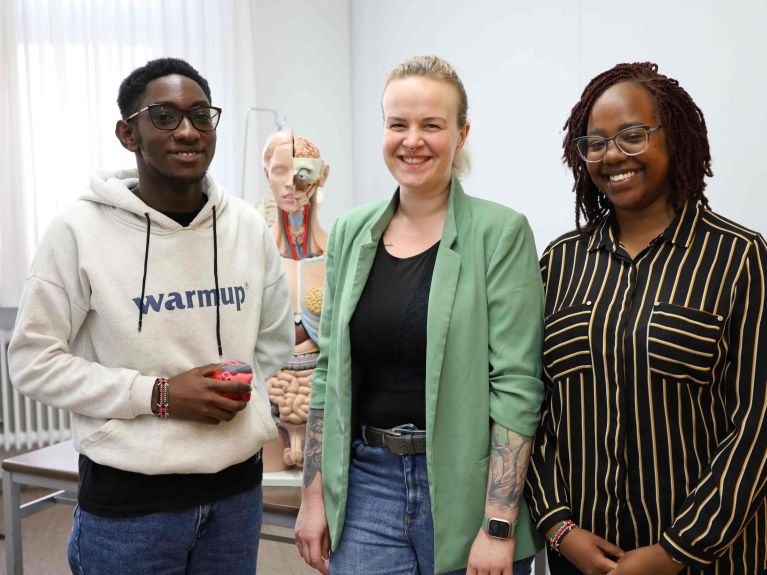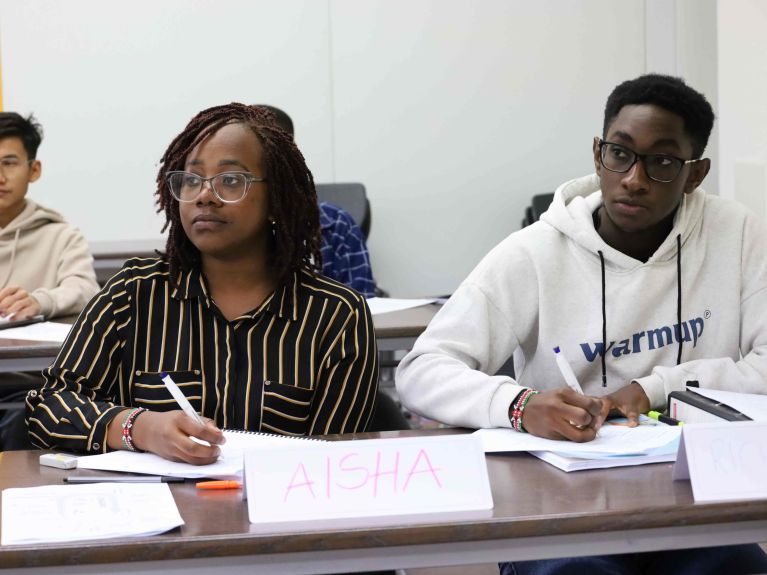From Kenya to Germany to train as a nurse
Specialist expertise, language proficiency and intercultural knowledge: a joint German-Kenyan project provides comprehensive support for those wishing to train as a nurse.

Aisha Mussa has wanted to become a nurse ever since she did an internship at a hospital in Nairobi two years ago. However, the chances of this dream coming true in her home country aren’t particularly good, she says: “It’s very expensive to do vocational training in Kenya. But the biggest problem is that there’s a very limited number of jobs at the hospitals.” The 22-year-old has now come to Germany to train in her dream profession. She has just had her lunch break and classes are about to resume.
It’s an advantage that we came as a group: we cook together, study together and help each other – that way we don’t get so homesick.
Along with three other women and two men from Kenya, Aisa Mussa was able to start a three-year nursing training programme at Caritas Hospital Bad Mergentheim in April 2024. After the initial surprise of rainy weather in April, Aisha Mussa has now taken her first walk in the sunshine through the historic spa town in Baden-Württemberg. “I feel comfortable here,” she says. “It’s an advantage that we came as a group: we cook together, study together and help each other – that way we don’t get so homesick.”
The best possible conditions for skilled international workers
The trainees are taking part in a project being run jointly by Koblenz University of Applied Sciences and Mount Kenya University (MKU) in Nairobi. According to forecasts, there will be a shortage of up to 500,000 nurses in Germany by 2030. Professor of Human Resource Management at Koblenz University of Applied Sciences Christian Lebrenz says that in order to reduce the shortage in the long term, it is essential not only to recruit talented youngsters from abroad but also to ensure they remain in Germany on a lasting basis. The project gives him the opportunity to find out how to create the best possible conditions for this to happen.

Lebrenz says that it’s fascinating to be able to assess the entire process from an academic standpoint – from the selection of applicants through to their integration at their place of residence in Germany. “A procedure that is structured, secure and fair is a key requirement when it comes to attracting more prospective nurses to Germany. If everyone has to fight their way through the bureaucratic jungle on their own, we won’t get the numbers we need.” Lebrenz’s former research assistant Caroline Mwangi came up with the idea for the project, which has not yet received any external funding. She is a co-founder of the platform AG-Career Hub, which supports African students and skilled workers in getting established in Germany.
Medical subject matter and intercultural knowledge
The current trainees began preparations around a year and a half before coming to Germany: they first completed a self-financed German course up to B2 level and then did a programme at MKU on which they were taught not just medical terminology and a knowledge of anatomy but also about life in Germany.
We’ve been involved in recruiting skilled workers from abroad for years, so we know how important it is for trainees to have intercultural knowledge in addition to a good level of language proficiency.
Caritas Hospital Bad Mergentheim was involved in developing the curriculum from the very beginning. “We’ve been involved in recruiting skilled workers from abroad for years, so we know how important it is for trainees to have intercultural knowledge in addition to a good level of language proficiency,” says Norbert Stolzenberger, Head of the Training Centre at the hospital.

For example, it’s vital for trainees to be made aware early on that the responsibilities of a professional nurse in Germany include the physical care of patients, because in Kenya and many other countries this kind of care is provided by the relatives, explains Stolzenberger. In order to make it easier for the trainees to settle in Bad Mergentheim, the hospital arranges for older trainees to act as their “buddies”. Initiator Caroline Mwangi also puts them in touch with the Kenyan community in Germany.
The dual vocational training system in Germany provides opportunities
While some of the countries that send nurses to Germany are suffering a shortage of skilled labour themselves, the level of youth unemployment in Kenya is very high. The Federal Government is currently planning to conclude a skilled labour agreement with the East African country, where the average age of the population is under 20. The Kenyan school system has a good reputation, with around 85 per cent of each year group completing the twelfth grade. “But very few people can afford to go on to university or do vocational training lasting several years because both are subject to fees,” says Christian Lebrenz. “Dual vocational training in Germany provides opportunities for these young people.”
The project’s second year group is currently doing the preparatory programme and is due to come to Bad Mergentheim in August 2024 – providing everything goes as planned. Despite the support and advice provided by the German embassy in Nairobi, the bureaucratic hurdles were higher than expected, say Lebrenz and Stolzenberger. Getting the participants’ documents officially recognised took a long time, for example, recalls 21-year-old trainee Richard Gekonge: “But we’re here now, that’s the main thing! What I wish for most is to do well in my training and then be able to work in Germany.”


